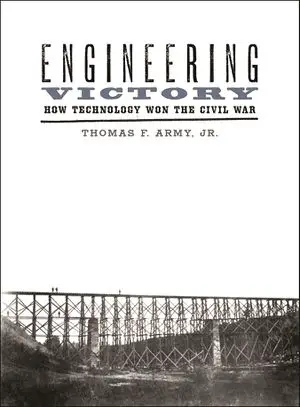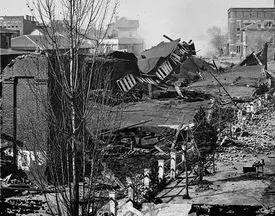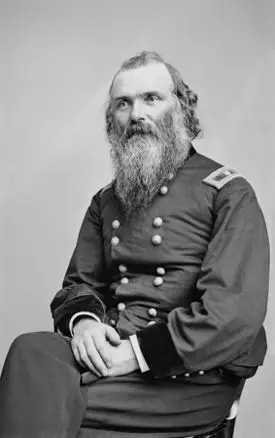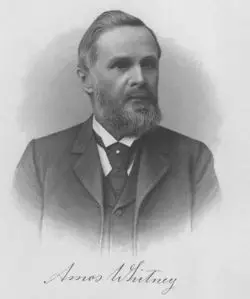Engineering Victory during the Civil War: Interview with Thomas F. Army, Jr.
"The line between disorder and order lies in logistics...." -Sun Tzu
"Amateurs talk about tactics, but professionals study logistics." - General Robert H. Barrow, USMC
Logistics win wars. Logistics is the coordination of complex operations such as moving, housing and supplying troops and their equipment. War is the ultimate test of any logistician. During the Civil War, the Union troops fought almost the entire war in the South. Thomas F. Army, Jr. argues in his new book Engineering Victory: How Technology Won the Civil War published by Johns Hopkins University Press that the Union's engineering prowess during Civil War gave it an distinct advantage over the Confederacy. Due to a superior education system, Northern armies had individuals who could use scientific ingenuity and innovation to rapidly build and repair roads, bridges, railways. Unlike the Confederacy, the Northern armies lacked the home field advantage. Dr. Army's delves deeply into a aspect of the Civil War that most other historians have only discussed in passing.
Dr. Thomas F. Army, Jr. is an adjunct professor at Quinebaug Valley Community College.
Here is our interview with Dr. Army.
How would you describe yourself as a historian? Are you a historian of science and technology or a Civil War historian?
Technological development fascinates me. I look at a skyscraper and bridge, or hear about a medical breakthrough and bionics developments and wonder how it is that these remarkable things are accomplished. I marvel at the imagination, knowledge, and perseverance of the people behind these technological masterpieces. Just recently I visited a World War II museum near Boston, MA, and I had the opportunity to send a message using German engineer Arthur Scherbius's famous Enigma cipher machine.
Yet, notwithstanding my great interest in technology, and that my book, Engineering Victory: How Technology Won the Civil War deals with the impact technology had on the outcome of the war, I would not consider myself a historian of science and technology, but rather a Civil War historian. My book focuses less on northern technological advancements used to win the war—metallurgical development, weapons design, railroad engine improvements, and naval architecture—but rather on the widespread exchange of technical information in the North during the antebellum period, and the impact that shared knowledge had on bringing about Union victory. It was one thing to grasp complex bridge design, and men such as Daniel McCallum and Herman Haupt did, but it was another thing entirely when in the middle of nowhere the army needed to cross a swift running river with no pontoon train and no McCallum and Haupt in sight. One of the questions my book answers is why was it that northern soldiers were able to solve these bridging problems and southern soldiers, for the most part, were unable to do this.
How would you summarize your book?
My book explores the critical advantage the Union held over the Confederacy in military engineering. The skills Union soldiers displayed during the war at bridge building, railroad repair, and road making demonstrated mechanical ability and often revealed ingenuity and imagination. These skills were developed during the antebellum period when northerners invested in educational systems that served an industrializing economy. Before the war, northern states’ attempt at implementing basic educational reforms, the spread of informal educational practices directed at mechanics and artisans, and the exponential growth in manufacturing all generated a different work related ethos than that of the South.
Plantation slavery generated fabulous wealth for a tiny percent of the southern white population. It fostered a particular style of agriculture and scientific farming that limited land use. It curtailed manufacturing opportunities, and it stifled educational opportunities for the middle and lower classes because those in political power feared that an educated yeomanry would be filled with radical ideas such as social equality, and, worst of all, abolition. These differences in the North and South produced unique skill sets in both armies, and consequently, resulted in more successful and resourceful Union engineering operations during the war. Between 1861 and 1865 the North engineered victory.
"Leaders win through logistics." Logistics is a fairly unsexy aspect of military history, but without good logistics armies cannot function. Are you trying to refocus attention back onto this subject and emphasize how important it was for the Union victory?
Logistics is not a sexy aspect of military history, but most professional soldiers and military historians recognize its importance. The quote I use in the book succinctly states the case. British Field Marshall Archibald Percival Wavell, a veteran of the Boer War, World War I, and World War II said: "The more I see of war, the more I realize how it all depends on administration and transportation.... It takes little skill or imagination to see where you would like your army to be and when; it takes much knowledge and hard work to know where you can place your forces and whether you can maintain them there."
It was clear that both Union and Confederate commanders were cognizant of the importance of logistics for victory, but only northern armies were able to successfully deal with the enormity of their logistical challenges. I argue that without the unique and remarkable Union engineering operations conducted by common laborers, machinists, tool makers, and both common school-educated and West Point-trained engineers, it seems unlikely that the North could have fought the war effectively, much less won it. Union generals were forced to execute a strategy that demanded the control of 750,000 square miles of territory and defeat a highly skilled enemy fighting force defending their homes.
So, yes, I'm trying to refocus attention back to what I consider the difference maker in the war's outcome. Both sides had skilled generals, and both sides had poor ones. Both sides had brave men and both had cowards. Both sides faced logistical difficulties. Before 1861 the largest army the United States ever placed in the field was General Winfield Scott's army in Mexico. In 1861, no army professional in the U. S. could even imagine a war the size and scope of what was to come. There were no textbooks on how to supply and sustain an army of 105,000 men deep within enemy territory. It all had to be trial and error, imagination and ingenuity.
Moreover, the outcome of the Civil War depended on the Union army's ability to improvise and take the war to the South. Northern armies operated on unfamiliar terrain, which included mountain ranges, swamps and wetlands, alluvial plains, dismal road systems, and poorly constructed railroads. Union engineers and infantry, who occasionally were called upon to serve as engineers, were able to tackle these challenges with ingenious solutions. The reason why they were able to do this rested in the textile mills, railroad yards, and machine shops of antebellum America.
Would superior engineering have dramatically helped the Confederacy during the war or was it more important for the Union?
It could be argued that having few mechanics or civil engineers within the ranks of the Confederate army made little difference in the South's ability to fight the war, given that most of the war was fought in the South and Confederate armies in the field did not need extensive logistical support. There were, however, crucial Confederate engineering mistakes.
Fort Henry serves as one example of the price paid due to the Confederacy's inability to create and sustain an effective engineering organization during the war. Thus the chances for Confederate independence were diminished. My line of reasoning goes this way: At what point in the war did the South finally lose the opportunity for independence? Despite manpower shortages, poor logistical support, inferior railroad operations, limited industrial output, bickering generals, and a Union blockade, in early August 1864 the Confederacy still had the chance to gain its independence or perhaps return to the Union with slavery in place, and with a new territorial policy that would allow for slavery's expansion. Why? The 1864 presidential election was three months away and Lincoln's Democratic challenger, George B. McClellan, was gaining support and momentum. The northern public was tired of the killing and maiming, angered and frustrated by the stalled Union offensives at Petersburg and Atlanta, and not quite certain about African American emancipation.
If southern armies could maintain the stalemate until November, a new president might try to negotiate an end to the war on southern terms. Remember McClellan was not favorably disposed to African American freedom. Yet, Sherman took Atlanta on September 1, 1864, Lincoln and the northern public had the victory needed, the president won the election and promised to prosecute the war for four more years. The Confederacy was finished. So if Sherman had been delayed three months before occupying a position to take Atlanta, the outcome of the election might have been different. Therefore, if Fort Henry had been built more carefully it would have delayed the Union army's capture of Nashville, and their subsequent advance into the Confederate heartland. Of course, Union engineering had everything to do with that advance and the successful campaigns that followed.

Why was the Confederacy unable to execute engineering operations comparable to the Union army?
The Confederate armies did not have the engineering manpower because during the antebellum period southern society was structured around the institution of slavery, and consequently, education was stifled for everyone except the middle class and plantation elite. Furthermore, to the South's way of thinking, manufacturing might challenge the powerful political forces behind the great wealth of the plantation economy. As a result, industrial development was discouraged or blocked.
For the leadership in the South before the war, hierarchy, aristocracy, and social control were the fundamental principles of God's divine plan in which rich and poor, intelligent and illiterate, leaders and followers could coexist in harmony and happiness. Education could upset the social balance. Public education could be dangerous. In 1860, only thirty-four percent of children between five and nineteen years old attended a common school. In the North, that number was ninety percent.
Furthermore, the small number of factories that did exist in the South most often used bondsmen as workers. These African American slaves were given a rudimentary education, and northern white factory workers migrating south who possessed advanced knowledge of machines and tools were kept far away from skilled slave workers. Fear of filling a slave's head with "radical" ideas about freedom and abolition was the motivating force behind the plantation elites' decision to clamp down on education for both slaves and poor whites.
An article that appeared in the 1852 Southern Quarterly Review summed up the idea: "Throughout the whole country...a settled determination exists to abolish slavery at the South...The diffusion of education in New England is likely to effect a dissolution of the Union...men whose lives are spent in humble toil, have little time for reflection." Throughout the 1850s some southern leaders started to recognize that if the South was to exist independently, without northern manufactured goods holding the South ransom, an economic transformation was essential. Nothing, however, was done. These astute southerners knew that education should be encouraged, but the fear of educated black slaves and poor whites trumped sound reason.
Is there any one technology that was more critical to the Union's technical advantages than anyone else?
One of the great advantages the Union held over the Confederacy was only indirectly connected to technology. During the antebellum period a number of northern railroad companies owned track that covered over 150 miles long. To operate these businesses like the Pennsylvania, New York Central, or Erie railroads required the creation of a decentralized management system. Operating divisions and various subdivisions were formed along the line to deal with the daily problems of running the railroad—engine, track, and bridge repair, ticketing and accounting, carpentry and painting. A management scheme developed that allowed men at the lower levels and their supervisors enough autonomy and authority to demonstrate their talents and to make decisions without waiting hours or days for a reply from corporate headquarters.
Daniel C. McCallum, general superintendent of the Erie Railroad before the war, was one of the designers of this new corporate structure ostensibly creating the concept of middle management. McCallum wrote: "All subordinates should be accountable to, and be directed by their own immediate superior only; as obedience cannot be enforced where the foreman in immediate charge is interfered with by a superior officer giving orders directly to his subordinates."
The United States Military Railroad, formed in 1862, adopted McCallum's model and he became the superintendent. This management system allowed the USMRR to function efficiently and support the complex logistical operations the Union army needed to win the war. Also when Confederate cavalry destroyed tracks and bridges, the North had the skilled manpower to repair them. In the South the "planter knows best" management model allowed little room for worker autonomy. The result was that southern governors and railroad owners were reluctant to give up their authority to or cooperate with a Confederate railroad bureau. This proved disastrous for Confederate logistics.
You discuss how educational reforms in the North helped prepare Union engineers for the war. How did science and engineering education in the North and South differ during the antebellum period?
Before the Civil War each section of the country made a choice about the role technology and science played in the development of their communities, and each section determined how resources were spent, schools formed, and labor was regarded. In the North, many people believed that technology assisted republicanism because, in providing economic opportunity, it led to "equality in class status" and promoted "the welfare of the many as opposed to the special privileges of the few." Consequently, local communities advocated for the expenditure of tax money spent on common schools that taught basic skills in reading, writing, and arithmetic.
The rudimentary knowledge acquired in common schools gave students avenues into machine shops and textile mills where young men learned how lathes and railroad turntables worked. The importance of technology and the possibility of inventing new machines created a culture that rewarded innovation. Christopher Spencer, Francis Pratt, and Amos Whitney worked out their own ideas at the Colt Armory in Hartford, Connecticut and then each went on to start their own businesses. Others did the same in the brass and machine tool industry.
By the 1840s, many northerners recognized the value of technical knowledge and most states offered opportunities to share information at statewide lyceums, scientific institutes, and agricultural fairs. These programs were free to anyone who wanted to attend their lectures and demonstrations. Agricultural fairs attracted people from all over the country, and they offered cash prizes for the best practical inventions. New self-sharpening straw cutters, excavating scrapers, and scythes were on display. These lyceums and fairs became idea factories, an outdoor classroom, a nineteenth-century Home Depot. When the war came, the men who worked in shipyards and railroad engine shops, those who became civil engineers or worked as machinists, or tinkered with tool making on their farms, enlisted in the Union army where it was soon apparent that West Point trained engineers would not adequately meet the army's demand. Therefore, engineer regiments were formed both in the eastern and western theaters of operation.
Since educational opportunities were limited in the South, and labor was associated only with African American slaves, Confederate armies had to rely on the few West Point trained engineers to carry the engineering burden. The Confederate Army of Northern Virginia did not attempt to form an engineering regiment until the summer of 1863, and then with only moderate success. Consequently, the North's efforts at educational reform and the conscientious development of information exchanges among working class people, unknowingly helped prepare Union engineering for the war to come. Conversely, during the antebellum period the leadership of the South made a choice to limit educational opportunities of the working class, minimize technological advances, and protect their hierarchical social structure constructed around the institution of slavery in order to protect their power and wealth.
How would you recommend instructors use your book in a Civil War or military history class?
Historians continue to argue with each other over who should be our intended audience. Should we write for the academic community or the general public? I believe my book is accessible to both groups. My thesis challenges previous interpretations of the question, why did the North win the Civil War? The opening chapter reviews the historiography of the question and I spend time looking at antebellum America. I think, however, any general reader interested in history will find the story very engaging.
On the other hand, students of the Civil War will find the book appealing because it is a new approach to a question that has lingered for the past 150 years. I imagine college instructors teaching the Civil War could use the book to challenge students to consider a new interpretation about why the North won or it could be used as part of a class on the historiography of the Civil War and Reconstruction.
Furthermore, the book could encourage discussions about how the military is a reflection of a nation's culture, and the role environment plays in fighting wars. A military history class at both undergraduate and graduate levels could use the text as an example of an unorthodox study of wars in general and the Civil War in particular, and as an important reminder of the role logistics and especially engineering plays in war.
Related DailyHistory.org Articles
- Interview:African American Soldiers During the Civil War: Interview with Author Bob Luke
- What Was the Significance of the Southwest in the Outcome of the Civil War
- Why Was the Battle of Antietam a Pivotal event in the American Civil War?
- Gilded Age/Progressive Era History Top Ten Booklist
- Did the Battle of Fredericksburg Change the Identities of Irish Soldiers?
Admin and EricLambrecht




